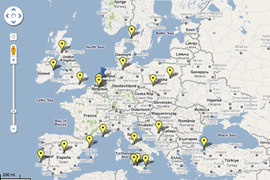A main cultural centre in Lisbon is launching a new musical program for young people. “CCB wants to be more pop, more rock, more soul, more reggae, more everything!” the announcement says.
CCB (Cultural Centre Belem) has a special history and is a special place for Lisbon. When it was built in 1993, it was shunned by most citizens. They claimed it was an ugly monster standing next to one of the most beautiful Portuguese attractions, Jeronimos Monastery. Thanks to the strong program and careful selection of artists, CCB became one of the most important cultural spots in the city. It is mainly famous for its classical music concerts and theatre performances. However, the time came to change; CCB wanted to attract a younger public and host funky concerts in almost every music style imaginable.
“We want to offer young people really qualitative music, whether it’s rock, pop, jazz, dub, electronic, or experimental music. There are a lot of places where there is just a DJ playing, but it’s not that sophisticated music. We want to give our listeners something more serious in terms of the quality of sound. It should be a cultural experience for them,” says Fernando Luís Sampaio, the CCBeat program director.
The centre is launching the CCBeat program because it realized there was a certain age gap in the audience CCB works for. “We have an art school for children, Fabrica Das Artes, where they can take part in plenty of workshops, but it’s until 14 to 16 years old. Then we have a main cultural program which is mostly aimed to people in their 30’s and older, and it’s mostly classical music and theatre. So, with CCBeat we want to create a cultural offer for teenagers and people in their 20’s and make CCB more modern,” says Miguel Leal Coelho, member of the board of directors for Centro Cultural de Belém.
The project was presented by three double concerts during three days from 19 until 21 May. There were two consecutive concerts each day, mainly of Portuguese contemporary musical bands.
The first to go on stage was LUME and Dead Combo and Caveiras Royal Orchestra. LUME (Lisbon Underground Music Ensemble) plays experimental jazz mixing it with funk and cabaret music. Dead Combo plays complicated guitar compositions while inserting classical orchestral music.
The second day was devoted to an American guitar player and singer Kaki King (the first woman named “Guitar God” by Rolling Stone magazine) and a Portuguese singer Áurea. They both sing soul, but a very different kind; Kaki King adds some drums and jazz rhythms, while Aurea mixes soul with pop.
On the third, closing day, the Diabo na Cruz and Linda Martini bands gave concerts. Diabo na Cruz mixes traditional Portuguese music with new pop-rock sounds and rhythms. Lina Martini plays alternative rock and is a child of the Internet. They became famous through the website Myspace.com.
“This mixture of styles is our signal for the new public we are waiting for. We are open to experiments and new unusual music styles,” says Sampaio.
It’s already known what the next stage of the CCBeat project will be. On 30 July, the British band Morcheeba is coming to CCB to present its new album “Blood Like Lemonade.”
It’s part of the group’s big European tour, and Lisbon is represented by CCB.
However, CCB’s job isn’t so easy. Portuguese youth are used to going to small places to listen to music they like.
“I don’t associate CCB with modern music,” says a 29-year-old Lisbon citizen, Andre Santos. “Usually I go to some favourite places in the Bairro Alto district. But I’d love if they made a good program for the younger ones. It’s a nice place to go, and I wouldn’t mind visiting it sometimes.”
CCB is aware of the situation but sees no danger in it. “We don’t want to compete with these places,” explains Coelho. “We just want to give people another opportunity and offer qualitative and thoroughly selected modern music”.
